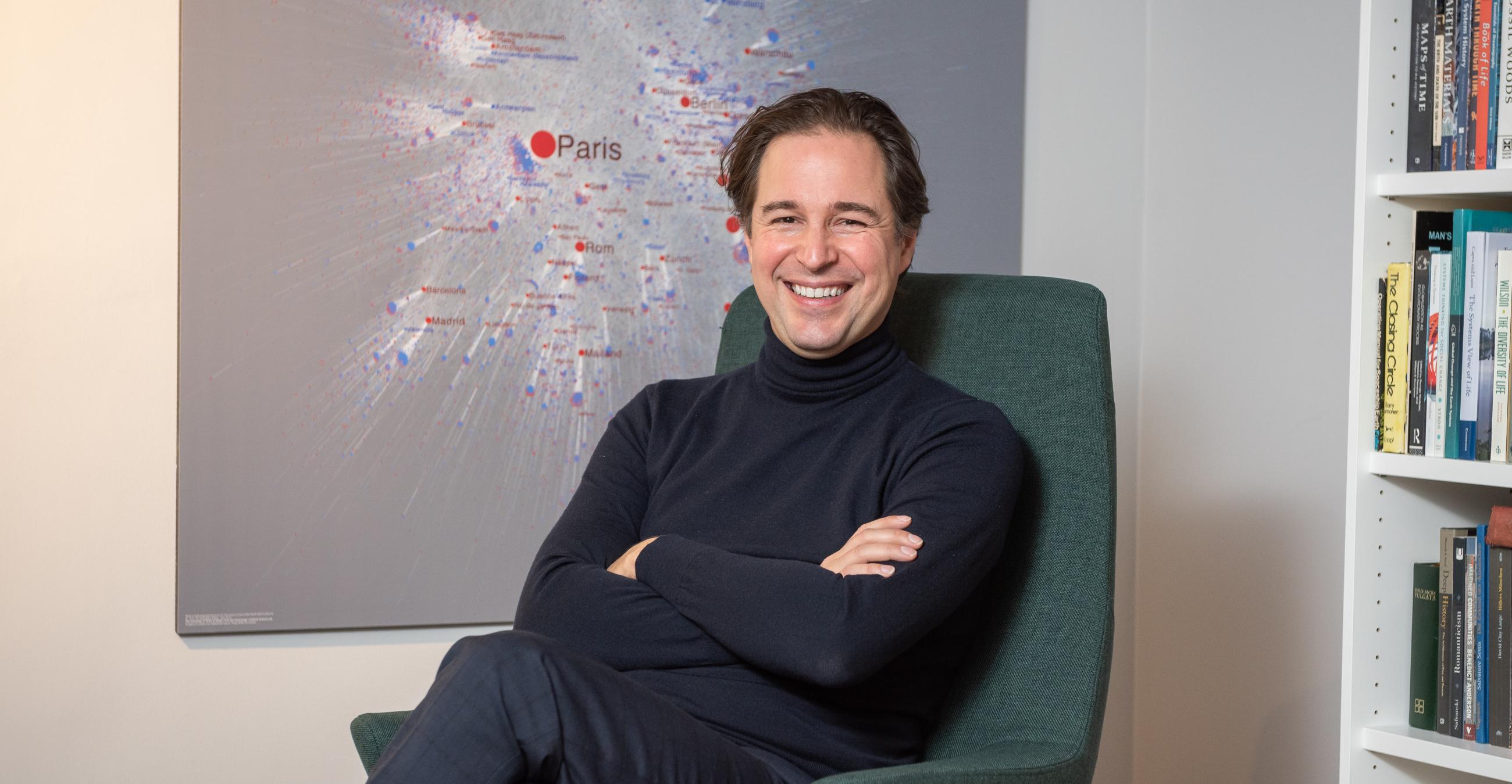TLU calender: What is up, professor Maximilian Günther Schich?
The focus researcher of March in the TLU calendar is the Research Professor of Cultural Data Analytics Maximilian Günther Schich. We asked him what is he up to and how he spends his free time.

What are the projects that you're currently working on?
I am a professor for cultural data analytics and I am currently leading and collaborating within the CUDAN Project at Tallinn University. This project engages in building a new approach of “Cultural Data Analytics” that integrates quantitative and qualitative methods, including aspects of art history, cultural semiotics, cultural history, creative industry studies, and also complexity science, computational linguistics, computational social science, data science, network science, machine learning, science of science, generative art, user experience design, and information visualization. Orchestrating a meaningful interplay between such a broad spectrum of “instruments”, the CUDAN research group works with and aims to make sense of digitized cultural heritage materials, born-digital data acquired from contemporary platforms, including text, images, video, sound, and numerical data.
As such, the CUDAN project brings together a group of brilliant people that are usually not easily found within the same room, including faculty, a number of senior postdoctoral fellows, and PhD students, all together from three schools within the university and collaborating with an even greater variety of external experts and stakeholders. One of the central ideas of CUDAN is to bring these different forms of expertise together, not only to create a space for exchange and to nurture discussion, but to engage in a systematic practice of “academic mixing”, to elaborate a shared intellectual foundation, in what we call the CUDAN Open Lab.
How do you spend your time apart from work? We are in a pandemic mode with Home Offices and constant online meeting work mode after all, how to balance work and leisure time?
I strongly believe in the positive value of meaningful “confusion”, including in my approach to life and work. Karl Lagerfeld once stated that he always does what he wants, including work. Most of us clearly can't always choose to engage with only the aspects of work and life we enjoy because we're not as wealthy as Karl was. Yet work has a big role in our lives, hence the idea behind the statement for me is that if we wish to be really good at something, we better like what we are doing, which is why I feel that most of the research I do as a scientist is enthusiasm driven.
We might do things that start out as leisure, and we may think these are “just” spare time activities, done out of joy. Then over time we might realise how such serendipitous activities of joy or curiosity could potentially develop into something one could do on a more professional level, as something much more profound emerges. Not born with great wealth, I found so far that this principle can be applied successfully, maximizing joy and purpose at the same time, both in my own relationship with work, as well as in nurturing students. As a result, a great percentage of the work I do, I would also do in my “spare” time. Inversely, in our research group we also apply “directed intuition”, a form of professional “serendipity” to strategically design new research products. So, it goes in both directions.
On a more personal note, however, I do love spending time and being involved with my family. Preparing food and eating together is a very important activity in our household, as is nature, particularly exploring the forest and the sea shore. Both are different every time we take a look. An essential personal aspect is music and art. My first job was in a record store, and I could not live or work without music. After decades of listening, if you discount deejaying, the pursuit of music has only become more active in recent years, as, for a non-musician, I probably spend too much time in front of my modular synthesizer. Drawing, in particular, is another essential activity that permeates my life, as I constantly use it to think and to relax. In terms of sport, I like to ski right out of and into the house in winter, doing the same with inline skates in summer. Tallinn is a fantastic place to do so.
What are your thoughts on the future developments of science?
I do believe that there is a possibility of new research fields developing, where previously separate subjects merge to form meaningful coalitions and integrations Regarding our understanding of culture something similar is happening as previously happened with systems biology. A more integrated field is emerging jointly, harnessing methods of humanities, natural science, and computation. While this happens, I do not think that the established so-called “silos'' of universities as such will merge to become one, or that more specific expertise will become obsolete. That is clearly not the case. I do think, however, it is feasible and necessary that universities provide institutional opportunities, where seemingly separate forms of research can mix in a functional way. There will still be differences, but the mutual benefit cannot be overestimated as shared practices, topics, and methods, are pursued together. Many for example are familiar with the saying that “networks are everywhere”. Consequently, but less well known, it has also become clear that a joint foundation of “network science” can help make sense everywhere. The ubiquity of networks, like many other shared issues, also applies to the sociocultural domain. And this is why the CUDAN project integrates qualitative inquiry, quantitative measurement, computation, creative and critical aesthetics in a single approach, with great enthusiasm.
Read more about CUDAN here.